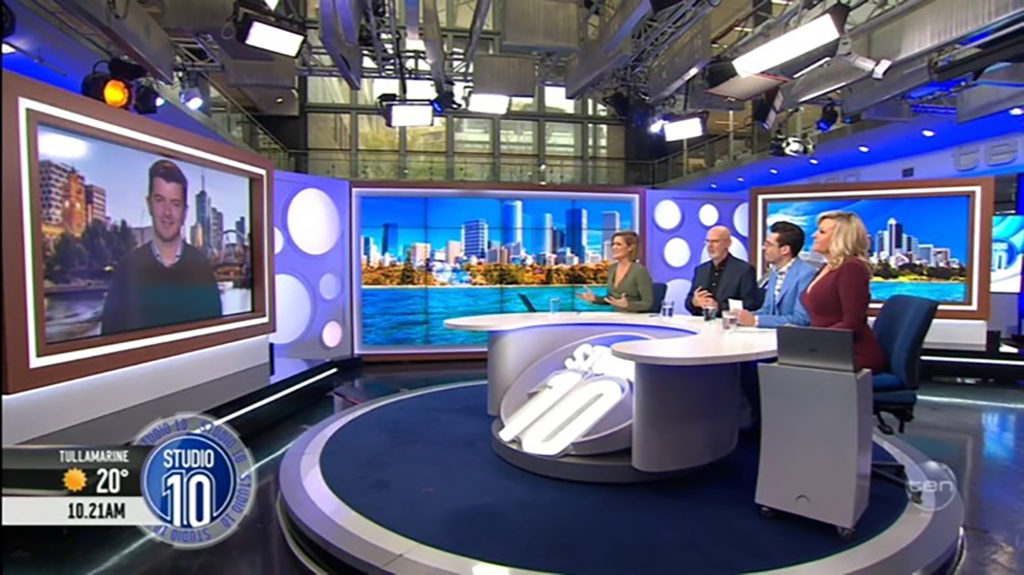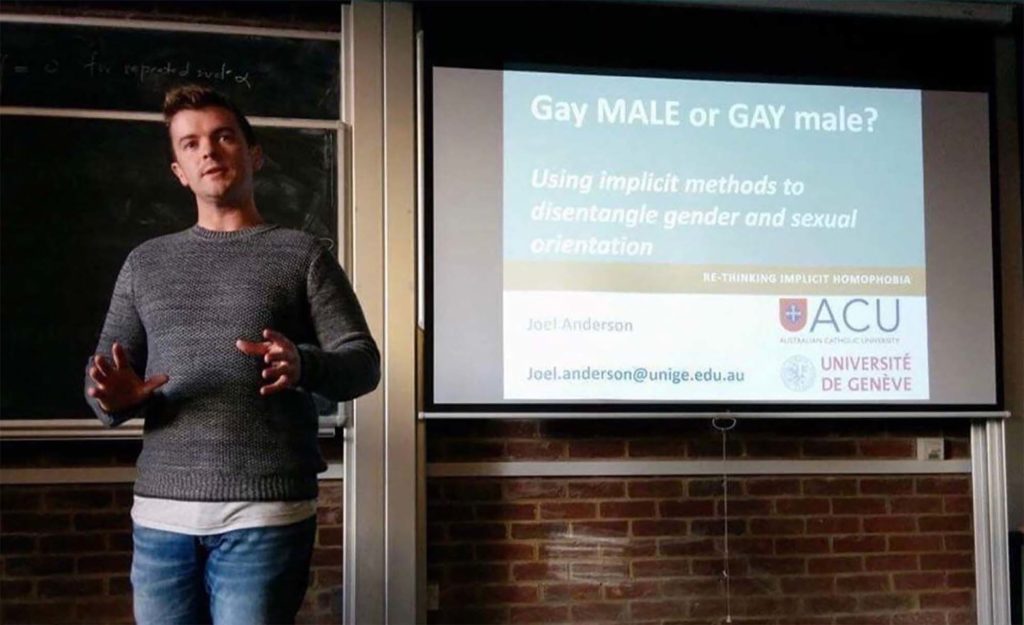First Person
Careers Up Close: Joel Anderson on Gender and Sexual Prejudices, the Freedoms of Academic Research, and the Importance of Collaboration

Image above: Anderson on national news in 2020 to discuss his research into unconscious bias in the wake of anti-trans protests in Australia.
Joel Anderson holds a dual appointment as a senior research fellow at Australian Catholic University and La Trobe University. His research is focused on group processes, with a specific interest on prejudice, stigma, and stereotypes.
Current role: Senior research fellow at the Institute for Positive Psychology and Education (Australian Catholic University) and the Australian Research Centre for Sex, Health and Society (La Trobe University), January 2021–present
Previously: Postdoctoral scholar, University of Geneva, Switzerland, 2016
Terminal degree: PhD in social psychology, Australian Catholic University, 2015
Recognized as an APS Rising Star in 2023
Exploring research interests • Conducting influential research • Encouraging collaboration • Looking forward
Exploring research interests
Following the completion of my PhD in 2015, I moved to Switzerland to take a postdoc in experimental social psychology at the University of Geneva to explore the various combinations of relationships between gender, social norms, masculinity, and sexual prejudice. It was an amazing experience—I was very lucky to make some lasting friendships and collaborations during my time in Europe, and the research was substantially different from my doctoral work, so it doubled as a valuable professional development opportunity. Plus, I was living in the land of chocolate and cheese. No complaints from me.
While I was living in Switzerland, a teaching-only position became available at my alma mater (ACU). I was visiting Australia for my brother’s wedding and applied on a whim. I started in this position at a time when ACU was disaggregating teaching staff and research staff. Finding time to do my research was very challenging, particularly as an unestablished researcher. This model has changed, and now the institution values both teaching and research. That first teaching-only job eventually evolved into a teaching and research position, but it can still be challenging to juggle the two.

Conducting influential research
When I was named an APS Rising Star earlier this year, I was working on a project exploring the nature and scope of LGBTQA+ conversion practices in Australia. We conducted a nationwide survey to get prevalence and impact data and to complement a series of qualitative projects that had already been conducted in this space. Sadly, experiences of conversion practices and exposure to the underlying ideology behind these practices are still common in Australia. This research has been both challenging and rewarding. The findings from this line of research have also been used to shape local and state laws in Australia!
I love the freedom of thought that comes with academic research work. When something new interests me or becomes important in my environment, I can just research that. For instance, a few years ago in Australia there was a referendum about marriage equality (to let people of the same sex/gender get married). When it was announced, I immediately dropped everything else I was doing and started a line of research on that. This line of research might be a bit unique for someone in social psychology research, but I found it really beneficial at the time to help me cope with this minority stress event.
Encouraging collaboration
I have a series of amazing PhD candidates that I supervise. It’s actually my favorite part of this job. They are engaged, intelligent, and inspirational. Wherever possible, I encourage the social aspects of the student/early-career researcher (ECR) experience—attending summer schools and conferences, reading groups, community (nonresearch) events related to their research—particularly in light of some very restrictive and long stretches of lockdowns during the COVID-19 pandemic. Here in Melbourne, we “won” the title of the world’s longest lockdown. Some of my PhD students did more than two years of their dissertation without being able to access their office or meet their peers and, in some cases, without meeting me!
I encourage my students and other early-career researchers to network hard and effectively. I have some amazing collaborators, and it surprises a lot of people to know that most of them are at the same career stage as me. Almost every paper I’ve published has been with other ECRs. I guess the message is that you don’t need to be collaborating with big names. For me, it was important to find people who I enjoy working with, and who have similar values and goals to me, and foster those relationships.
Looking forward
Later this year I will start a 3-year fellowship on internalized prejudices. I will be focusing on the mechanisms by which people internalize social stigmas about their social groups and the processes by which people might be unable to “undo” this internalization process or manage the impacts of living with internalized prejudices.
I’m also very interested in strengths-based approaches to LGBTQA+ health and well-being and have started a new line of research in resilience for LGBTQA+ individuals and their communities.
Feedback on this article? Email [email protected] or login to comment. Interested in writing for us? Read our contributor guidelines.





APS regularly opens certain online articles for discussion on our website. Effective February 2021, you must be a logged-in APS member to post comments. By posting a comment, you agree to our Community Guidelines and the display of your profile information, including your name and affiliation. Any opinions, findings, conclusions, or recommendations present in article comments are those of the writers and do not necessarily reflect the views of APS or the article’s author. For more information, please see our Community Guidelines.
Please login with your APS account to comment.